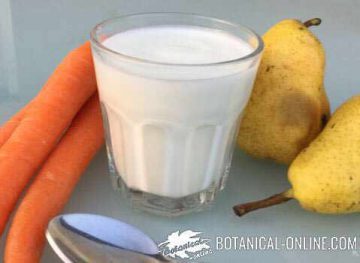Contents
- 1 What is kefir and what is it used for?
- 1.1 What is kefir and what are its benefits?
- 1.2 Kefir improves the state of the intestines and increases our defenses
- 1.3 Probiotic properties of kefir
- 1.4 Diet to improve intestinal flora
- 1.5 Kefir to lower cholesterol
- 1.6 Kefir provides highly digestible protein
- 1.7 How much fat does kefir provide?
- 1.8 Sugar in kefir
- 1.9 Vitamins and minerals in kefir
- 1.10 The minerals in kefir
What is kefir and what is it used for?
What is kefir and what are its benefits?
Milk kefir is a fermented milk beverage that provides probiotics, that is, microorganisms with beneficial properties for our intestinal flora. It is homemade from milk with kefir grains. The result, after two days of fermentation at room temperature, is a fermented milk beverage with excellent properties.
Kefir improves the state of the intestines and increases our defenses
 Thanks to the fermenting action of the bacteria and yeast in kefir, we obtain a series of highly important benefits, both nutritionally and through the probiotic effect produced by its content of bacteria and fungi, which promote a beneficial intestinal flora for an adequate state of the intestines.
Thanks to the fermenting action of the bacteria and yeast in kefir, we obtain a series of highly important benefits, both nutritionally and through the probiotic effect produced by its content of bacteria and fungi, which promote a beneficial intestinal flora for an adequate state of the intestines.
The probiotic effect promotes the natural protection of the intestines and, consequently, strengthens our defenses.
Probiotic properties of kefir
Kefir contains a set of microorganisms, including bacteria and fungi, capable of colonizing our intestines and providing benefits for maintaining good health.
These bacteria and yeasts act throughout the intestinal tract, producing protective mucus, fighting other pathogenic bacteria and yeasts (such as Salmonella or Candida albicans), and producing protective mucus. The intestinal mucosa is better protected, and the intestinal microflora, made up of beneficial microbes, regenerates. All of this promotes healthy colon, intestinal wall, and our defenses, with a greater ability to avoid infections.
Diet to improve intestinal flora
It’s worth mentioning that fermented milks, such as kefir, are very beneficial, but they only have an effect when the diet is healthy. To simplify, we could say that kefir provides “the seed,” a small population of bacteria, but it will only thrive if we take care of our intestinal flora daily with natural and quality foods. Vegetables provide fiber that feeds these bacteria (called the prebiotic effect): vegetables, fruits, legumes, nuts, seeds, and tubers.
On the other hand, it is advisable to avoid foods that are harmful to the intestinal flora, including additives and junk food.
Kefir to lower cholesterol
Another benefit of kefir is its property to lower cholesterol levels, even though the food itself contains cholesterol (the milk it is made from contains cholesterol).
It may initially seem surprising that bacteria can affect cholesterol, but if we look at the latest scientific discoveries, we see that cholesterol is also closely linked to the gut microbiota. At least one gram of cholesterol reaches the intestine daily, which can come from the diet or from bile itself. Naturally, the gut microbiota, in daily contact with this substance, has learned to break it down. This is how, in recent years, it has been shown that the gut microbiota is capable of degrading cholesterol.
On the other hand, the bacteria produce a series of substances that are absorbed and, when they reach the liver, prevent cholesterol production. In scientific terms, they inhibit the endogenous synthesis of cholesterol by blocking the enzyme HMG-CoA reductase. This is the same mechanism used by statin drugs to lower cholesterol. For this effect to be more potent, it is best to consume kefir at night, which is when the process of cholesterol synthesis takes place.
Of course, to obtain the cholesterol benefits of kefir, it’s essential to follow a proper diet for cholesterol. Consuming refined flours, sugars, and unhealthy fats produces an increase in triglycerides and cholesterol.
Kefir provides highly digestible protein
Its benefits do not lie solely in its probiotic effects but also in the significant nutritional value of the milk used to make kefir. The proteins in milk kefir are of high biological value.
In this case, since they are partially digested thanks to fermentation, the proteins are predigested in the form of amino acids, which are much easier to absorb, digest and tolerate.
How much fat does kefir provide?
The amount of fat in kefir will depend on the type of milk used in its production, which can range from whole milk to semi-skimmed or completely skimmed milk.
At this point, it’s worth mentioning that, according to the latest research, skimmed dairy products have no advantage over full-fat dairy, despite having fewer calories. People who consume fat-free dairy are not necessarily thinner. To make matters worse, skimmed dairy products have lost most of their healthy fat-soluble vitamins.
For all of the above-mentioned, it seems that consuming whole dairy products, without artificial sweeteners or sugars, is more advisable. A few raisins can be added for sweetness.
If it is made in an aqueous medium (water kefir), obviously its fat content will be lower since the water does not contain any type of fat, being more beneficial the consumption of the latter two in people who must control or even avoid the contribution of lipids.
Sugar in kefir
Kefir has less sugar than milk because the ferments convert lactose (a naturally occurring sugar in milk) into lactic acid and other compounds. It is therefore a low sugar, low lactose product.
Furthermore, it has been observed that the ingestion of kefir by people with lactose intolerance improves dairy tolerance, due to its probiotic effect.
In any case, the fact that it is better tolerated under any circumstances does not guarantee that all people with milk intolerance will tolerate it, but it is advisable to test it in each particular case.
Vitamins and minerals in kefir
Kefir contains many minerals and a wide range of vitamins, making it a very nutritious food. It has all types of vitamins, both those of bacterial and animal origin, and both fat-soluble vitamins (such as those contained in milk fat) and water-soluble vitamins.
Therefore, eating kefir helps ensure a good quality daily intake of minerals and vitamins. Among the vitamins and minerals it provides, we highlight:
- B vitamins: important for proper glucose metabolism, tissue regeneration, improved circulation, red blood cell production (in cases of anemia), etc.
- Vitamin A: essential for the immune system and for building our structures and muscles.
- Vitamin K: very important for strong bones.
- Calcium: it is also involved in bone growth. In addition, good calcium levels are essential for improving circulation and for improving hypertension.
The minerals in kefir
Due to its mineral content; in addition to being considered beneficial for its calcifying effect (it is a calcium provider in the body calcium to the body), it is also very interesting as an alkaline or basifying food (it reduces the acidity of the body).
The alkalinizing effect of kefir, like that of yogurt, milk, and other dairy products, is very important. This alkalinizing capacity is based on its richness in calcium, magnesium, manganese, and zinc.
Kefir is an alkaline food capable of counteracting the acidity of other very acidic foods such as most foods of animal origin (meats, fish, shellfish, etc.).
Furthermore, to enhance the alkaline effect, it should be accompanied by others of plant origin (peas, artichokes, lentils, Brussels sprouts, corn, almonds, walnuts, hazelnuts, etc.). Excessive acidity in the body is harmful to health (See how to reduce body acidity).
![]() More information on kefir
More information on kefir








